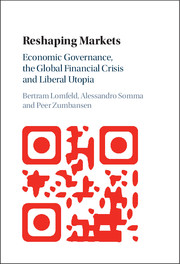Book contents
- Reshaping Markets
- Reshaping Markets
- Copyright page
- Contents
- Figures
- Contributors
- Introduction: reshaping markets and the question of agency
- Part I Crisis and normality in transnational market regulation
- Part II Austerity woes: trials and tribulations of debt
- Part III Reforming finance: systemic risk and accountability
- Part IV Transforming contract
- 11 Sustainable contracting: How standard terms could govern markets
- 12 Anti-discrimination law and social policy-making
- 13 European or American style? Cultures of contract regulation*
- Part V Conceptual Utopia: the market after the market
- Index
- References
11 - Sustainable contracting: How standard terms could govern markets
from Part IV - Transforming contract
Published online by Cambridge University Press: 05 May 2016
- Reshaping Markets
- Reshaping Markets
- Copyright page
- Contents
- Figures
- Contributors
- Introduction: reshaping markets and the question of agency
- Part I Crisis and normality in transnational market regulation
- Part II Austerity woes: trials and tribulations of debt
- Part III Reforming finance: systemic risk and accountability
- Part IV Transforming contract
- 11 Sustainable contracting: How standard terms could govern markets
- 12 Anti-discrimination law and social policy-making
- 13 European or American style? Cultures of contract regulation*
- Part V Conceptual Utopia: the market after the market
- Index
- References
- Type
- Chapter
- Information
- Reshaping MarketsEconomic Governance, the Global Financial Crisis and Liberal Utopia, pp. 257 - 282Publisher: Cambridge University PressPrint publication year: 2016
References
- 1
- Cited by



